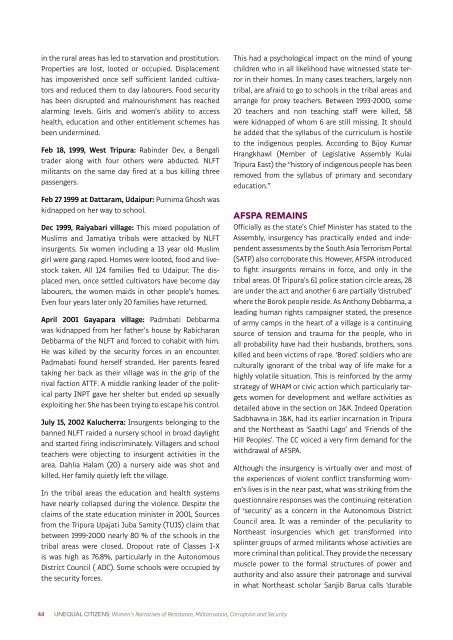CC_India
CC_India
CC_India
Create successful ePaper yourself
Turn your PDF publications into a flip-book with our unique Google optimized e-Paper software.
in the rural areas has led to starvation and prostitution.<br />
Properties are lost, looted or occupied. Displacement<br />
has impoverished once self sufficient landed cultivators<br />
and reduced them to day labourers. Food security<br />
has been disrupted and malnourishment has reached<br />
alarming levels. Girls and women’s ability to access<br />
health, education and other entitlement schemes has<br />
been undermined.<br />
Feb 18, 1999, West Tripura: Rabinder Dev, a Bengali<br />
trader along with four others were abducted. NLFT<br />
militants on the same day fired at a bus killing three<br />
passengers.<br />
Feb 27 1999 at Dattaram, Udaipur: Purnima Ghosh was<br />
kidnapped on her way to school.<br />
Dec 1999, Raiyabari village: This mixed population of<br />
Muslims and Jamatiya tribals were attacked by NLFT<br />
insurgents. Six women including a 13 year old Muslim<br />
girl were gang raped. Homes were looted, food and livestock<br />
taken. All 124 families fled to Udaipur. The displaced<br />
men, once settled cultivators have become day<br />
labourers, the women maids in other people’s homes.<br />
Even four years later only 20 families have returned.<br />
April 2001 Gayapara village: Padmbati Debbarma<br />
was kidnapped from her father’s house by Rabicharan<br />
Debbarma of the NLFT and forced to cohabit with him.<br />
He was killed by the security forces in an encounter.<br />
Padmabati found herself stranded. Her parents feared<br />
taking her back as their village was in the grip of the<br />
rival faction ATTF. A middle ranking leader of the political<br />
party INPT gave her shelter but ended up sexually<br />
exploiting her. She has been trying to escape his control.<br />
July 15, 2002 Kalucherra: Insurgents belonging to the<br />
banned NLFT raided a nursery school in broad daylight<br />
and started firing indiscriminately. Villagers and school<br />
teachers were objecting to insurgent activities in the<br />
area. Dahlia Halam (20) a nursery aide was shot and<br />
killed. Her family quietly left the village.<br />
In the tribal areas the education and health systems<br />
have nearly collapsed during the violence. Despite the<br />
claims of the state education minister in 2001, Sources<br />
from the Tripura Upajati Juba Samity (TUJS) claim that<br />
between 1999-2000 nearly 80 % of the schools in the<br />
tribal areas were closed. Dropout rate of Classes I-X<br />
is was high as 76.8%, particularly in the Autonomous<br />
District Council ( ADC). Some schools were occupied by<br />
the security forces.<br />
This had a psychological impact on the mind of young<br />
children who in all likelihood have witnessed state terror<br />
in their homes. In many cases teachers, largely non<br />
tribal, are afraid to go to schools in the tribal areas and<br />
arrange for proxy teachers. Between 1993-2000, some<br />
20 teachers and non teaching staff were killed, 58<br />
were kidnapped of whom 6 are still missing. It should<br />
be added that the syllabus of the curriculum is hostile<br />
to the indigenous peoples. According to Bijoy Kumar<br />
Hrangkhawl (Member of Legislative Assembly Kulai<br />
Tripura East) the “history of indigenous people has been<br />
removed from the syllabus of primary and secondary<br />
education.”<br />
AFSPA REMAINS<br />
Officially as the state’s Chief Minister has stated to the<br />
Assembly, insurgency has practically ended and independent<br />
assessments by the South Asia Terrorism Portal<br />
(SATP) also corroborate this. However, AFSPA introduced<br />
to fight insurgents remains in force, and only in the<br />
tribal areas. Of Tripura’s 61 police station circle areas, 28<br />
are under the act and another 6 are partially ‘distrubed’<br />
where the Borok people reside. As Anthony Debbarma, a<br />
leading human rights campaigner stated, the presence<br />
of army camps in the heart of a village is a continuing<br />
source of tension and trauma for the people, who in<br />
all probability have had their husbands, brothers, sons<br />
killed and been victims of rape. ‘Bored’ soldiers who are<br />
culturally ignorant of the tribal way of life make for a<br />
highly volatile situation. This is reinforced by the army<br />
strategy of WHAM or civic action which particularly targets<br />
women for development and welfare activities as<br />
detailed above in the section on J&K. Indeed Operation<br />
Sadbhavna in J&K, had its earlier incarnation in Tripura<br />
and the Northeast as ‘Saathi Lago’ and ‘Friends of the<br />
Hill Peoples’. The <strong>CC</strong> voiced a very firm demand for the<br />
withdrawal of AFSPA.<br />
Although the insurgency is virtually over and most of<br />
the experiences of violent conflict transforming women’s<br />
lives is in the near past, what was striking from the<br />
questionnaire responses was the continuing reiteration<br />
of ‘security’ as a concern in the Autonomous District<br />
Council area. It was a reminder of the peculiarity to<br />
Northeast insurgencies which get transformed into<br />
splinter groups of armed militants whose activities are<br />
more criminal than political. They provide the necessary<br />
muscle power to the formal structures of power and<br />
authority and also assure their patronage and survival<br />
in what Northeast scholar Sanjib Barua calls ‘durable<br />
44 UNEQUAL CITIZENS: Women’s Narratives of Resistance, Militarisation, Corruption and Security


